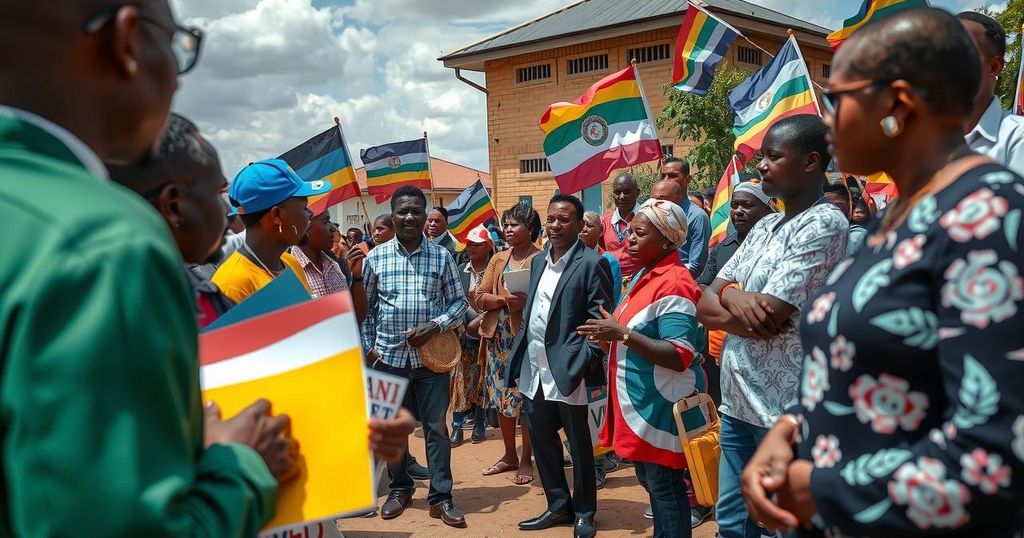Botswana’s Election: A Critical Decision for the Future of the BDP

Botswana’s election on October 30, 2024, tests whether the Botswana Democratic Party, in power for 58 years, retains leadership amid rising economic challenges, particularly due to decreased diamond demand. President Mokgweetsi Masisi is seeking reelection, facing opposition from three candidates. Unemployment has surged, prompting calls for economic diversification, while Masisi’s previous administration faced criticism over delayed salaries for government workers. The election may also reignite tensions with former President Ian Khama, further complicating the political landscape.
Botswana’s electoral process commenced on October 30, 2024, as citizens prepared to vote in a pivotal election that would determine the future of one of Africa’s longest-ruling political parties, the Botswana Democratic Party (BDP). With its inception dating back to the country’s independence from British rule in 1966, the BDP has steadfastly maintained power for 58 years. The election not only serves as a referendum on the party’s sustained leadership but also on the policies and directions the government has pursued amid emerging economic challenges. President Mokgweetsi Masisi, a 63-year-old former educator and United Nations employee, is contending for a second and final term. The election will conclude the process of selecting members of Parliament, who will subsequently elect the president. Although Botswana is often lauded as a stable and peaceful democracy with commendable living standards, it currently faces heightened economic pressures primarily due to a global decline in diamond demand, upon which its economy heavily relies. In recent years, unemployment has surged to 27%, with significantly higher rates observed among the youth population. Acknowledging these economic grievances, the BDP has committed to reassessing and possibly altering its policy framework to foster greater economic diversification to reduce dependency on diamond exports. Current figures indicate that diamonds account for over 80% of Botswana’s export revenue and approximately 25% of its Gross Domestic Product (GDP). Three contenders challenge President Masisi for the presidency: Duma Boko from the opposition Umbrella for Democratic Change party, Dumelang Saleshando of the Botswana Congress Party, and Mephato Reatile from the Botswana Patriotic Front. In light of the recent economic turmoil, analysts suggest that the gap between the BDP and its opposition has narrowed, presenting the possibility of a competitive election. Notably, Botswana ranks as the second-largest diamond producer globally, with its pivotal company, Debswana (a joint venture with the De Beers Group), reporting a nearly 50% decline in rough diamond sales in the first half of 2024. This downturn has subsequently strained the national budget, prompting criticism directed at President Masisi and the ruling party for their inadequacies regarding economic diversification initiatives. In a concerning development, delays in salary payments to government employees have marred Botswana’s historically reliable governance reputation. To remedy the fiscal constraints, the BDP has indicated plans to focus on a comprehensive approach involving the agricultural and tourism sectors alongside enhanced processing of mineral resources to generate new revenue streams. Electoral registration data show that over a million individuals may participate in the vote, with a voter populace residing in a country characterized by vast, arid landscapes, including the expansive Kalahari Desert. The election may also rekindle tensions between President Masisi and former President Ian Khama, who has transformed into an opposition figure in exile since his departure from the BDP in 2021. Khama, who has accused Masisi of adopting totalitarian tactics against dissent, recently returned to spearhead opposition efforts against his erstwhile ally, advocating for the Botswana Patriotic Front.
Botswana has been widely regarded as a model of democratic governance in Africa, maintaining political stability and high living standards since its independence. However, recent economic shifts stemming from a global decline in diamond demand have introduced significant challenges for the nation, affecting its unemployment rate and prompting calls for diversification to alleviate reliance on the diamond industry. The BDP, while historically dominant, now faces opposition backed by citizens who are increasingly concerned about economic performance and governance issues. This election thus represents not only a contest for power but also a potential inflection point for Botswana’s economic future.
The upcoming election in Botswana symbolizes a critical juncture in the nation’s political and economic landscape. As the BDP seeks to maintain its historical grip on power amid economic adversity and public discontent, the prospect of substantial political change looms on the horizon. The outcomes of these elections will potentially redefine not only governance in Botswana but also the strategies employed to navigate economic challenges moving forward.
Original Source: apnews.com








